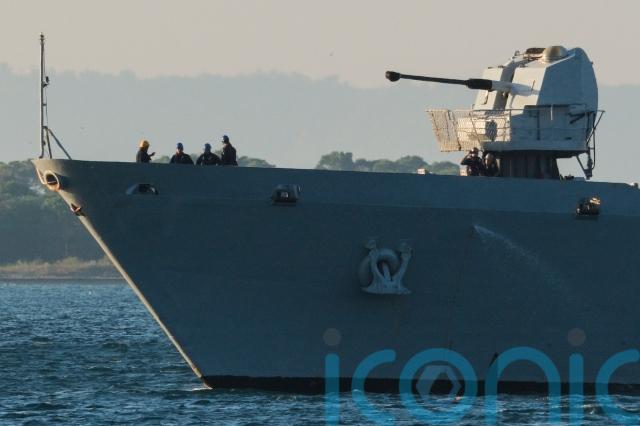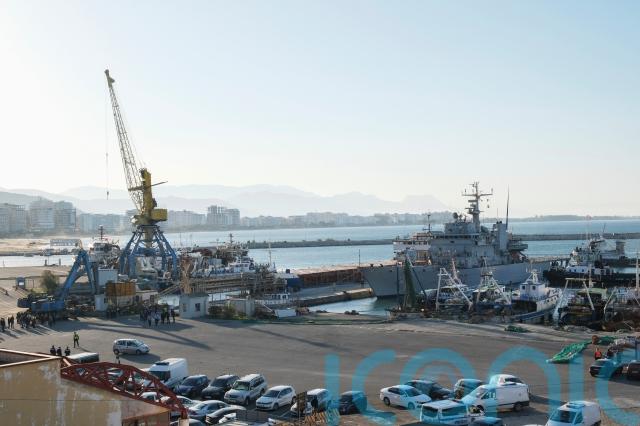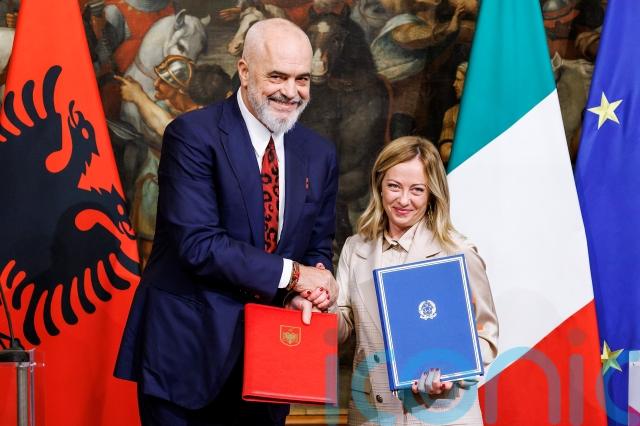
An Italian navy ship has docked at the Albanian port of Shengjin to bring the first group of 16 migrants intercepted in international waters.
The naval ship Libra left the port of Lampedusa on Monday with 16 men – 10 from Bangladesh and six from Egypt – who were rescued at sea after departing from Libya, a ministry spokesman said.
Last week Italy formally opened two centres in Albania where it plans to process thousands of asylum-seekers outside its borders.

The centres will only house adult men, while vulnerable people such as women, children, the elderly and those who are ill or victims of torture will be accommodated in Italy. Families will not be separated.
Italian Ambassador to Albania Fabrizio Bucci said on Friday the two centres were ready to process migrants after the opening was delayed for months to consolidate the crumbling soil at one centre in Gjader.
A small group of activists gathered at the entrance of the port to protest the arrival of the migrants, holding a banner saying: “The European dream ends here.”
“This deal is against human rights, more concretely the migrants’ rights,” said Edison Lika, a protester.
Though the centre has capacity for 3,000 migrants, it will start with 400 and increase to 880 in a few weeks.
The number of people reaching Italy along the central Mediterranean migration route from North Africa has fallen by 61% in 2024 from 2023.

According to the Italian Interior Ministry, as of October 15, 54,129 migrants have arrived in Italy by sea this year, compared to 138,947 by the same date last year.
Under a five-year deal signed last November by Italian Premier Giorgia Meloni and her Albanian counterpart, Edi Rama, up to 3,000 migrants picked up by the Italian coast guard in international waters each month will be sheltered in Albania.
They will be screened initially on board the ships that rescue them before being sent to Albania for further screening.
The two centres will cost Italy 670 million euros (£561 million) over five years. The facilities are run by Italy and are under Italian jurisdiction, while Albanian guards provide external security.
The first centre, an area in Shengjin, 66 kilometres (40 miles) northwest of the capital, Tirana, is used for screening newcomers.
While the other centre, about 22 kilometres (14 miles) to its east near the former military airport in Gjader, accommodates migrants during the processing of their asylum requests.

Italian officials expect the Gjader centre will never be at full occupancy but that depends on the flow of migrants brought to Albania.
In Albania, the migrants retain their right under international and European Union law to apply for asylum in Italy and have their claims processed there, a move expected to take a maximum of 28 days, including any appeal case, to process.
Italy has agreed to welcome those who are granted asylum. Those whose applications are rejected face deportation directly from Albania.
The controversial agreement to outsource the housing of asylum-seekers to a non-EU member country has been hailed by some countries that, like Italy, are suffering a heavy burden of refugees.
But it has been slammed by human rights groups as setting a dangerous precedent.
The agreement was endorsed by European Commission President Ursula von der Leyen as an example of “out-of-box thinking” in tackling the issue of migration into the European Union.

Mr Rama has made it clear that no other country will be able to have such centres in Albania.
He said Albania felt an expression of gratitude for the tens of thousands of Albanians who were welcomed by Italy when communism fell in 1991, or support extended by Rome during the economic turmoil in 1997 and in the aftermath of the 2019 earthquake.
Ms Meloni and her right-wing allies have long demanded that European countries share more of the migration burden.
She has held up the Albania agreement as an innovative solution to a problem that has vexed the EU for years.
Subscribe or register today to discover more from DonegalLive.ie
Buy the e-paper of the Donegal Democrat, Donegal People's Press, Donegal Post and Inish Times here for instant access to Donegal's premier news titles.
Keep up with the latest news from Donegal with our daily newsletter featuring the most important stories of the day delivered to your inbox every evening at 5pm.